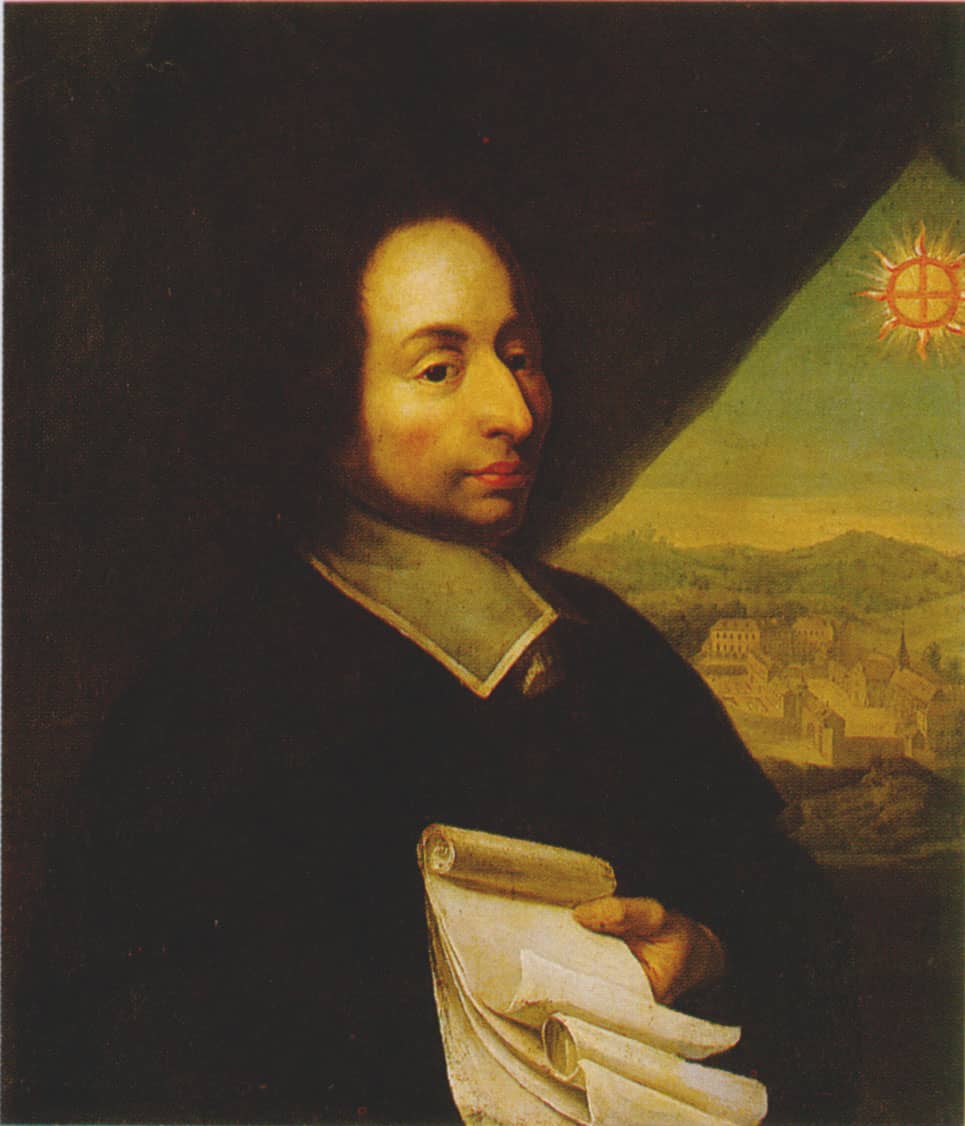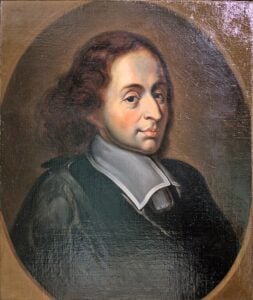
French mathematician and philosopher Blaise Pascal
©Romainbehar, CC0, via Wikimedia Commons – Original / License
Who Was Blaise Pascal?
Blaise Pascal was a famous French mathematician and philosopher. As a converter to Christianity, Pascal’s beliefs would come to extensively influence the religion and its practice. He also engaged in extensive mathematical work, developing multiple theorems that would influence the field for centuries.
Early Life
Blaise Pascal was born into means, as his father was the judge of a local tax court. Pascal’s mother died when he was 3. Pascal and his sister, Jacqueline, were both child prodigies, her in literature and him in mathematics. After the death of his mother, Pascal’s father took full responsibility for the education of his children, and that education immediately proved fruitful: At the early age of seventeen, Pascal wrote an essay on conic sections, an early display of mathematical genius from Pascal.
Quick Facts
- Full Name
- Blaise Pascal
- Birth
- June 19, 1623
- Death
- August 19, 1662
- Net Worth
- NA
- Children
- None
- Nationality
- French
- Place of Birth
- Clermont-Ferrand, Auvergne, France
- Fields of Expertise
- [“Mathematics”,”Philosophy”,”Geometry”,”Physics”,”Religion”]
- Contributions
- Invention of the early calculator, contributor to religion, scientific thought, and geometry
Pascal’s education largely centered around math and sciences, and he was never given a formal education in philosophy and religion as a result of his poor health. This makes his contributions to these areas all the more remarkable.
Religious Conversion
Pascal was raised Roman Catholic and stayed this way for much of his life. However, an illness his father endured caused him to reexamine his religious principles. After meeting with two disciples of the Jansenism sect of Christianity, Pascal found that this branch of the religion held more appeal to him. Jansenism adopted many forms of the Protestant church: It adhered to concepts such as predestination and divine grace as being key to eternal salvation. Not only did Pascal convert to Jansenism, but he convinced his entire family to do so by 1646. This conversion would have a major impact on Pascal’s personal and spiritual life, and he would become an influential writer in promulgating Jansenism beliefs.
Career
Worldly Period
As Pascal grew, he tested the theories of both ancient and modern scientists. For example, following up on the theories of men like Evangelista Torricelli and Galileo, Pascal put together mercury barometers and was able to determine differences in air pressure at different levels of elevation. This helped Pascal develop a functioning theory of atmospheric pressure.
During this time — also known as Pascal’s “worldly period” — Pascal worked extensively on issues like math, geometry, and air pressure. Pascal also came up with numerous inventions during this time. Some of his inventions include an early form of the syringe and the hydraulic press.
Religious Philosopher
After his conversion to Jansenism, Pascal would go on to make numerous writings and give many quotes on the subject of religion, religious conversion, and religious values. Indeed, some of Pascal’s most famous quotes pertain to his experience with religion and his battles with the Catholic Church in defense of Jansenism.
What Did Pascal Do and Invent?
The Pascaline
Pascal invented one of the earliest forms of a calculator, known as the Pascaline. This mechanical machine used integers to assist in calculations, and Pascal originally developed the device to help his father in his career as a tax collector. In 1644, at the age of 21, Pascal showed the device off to the chancellor of France. This calculator would prove to be the foundation for many modern scientific breakthroughs of the modern-day, including the computer.
This is arguably Pascal’s most well-known invention.
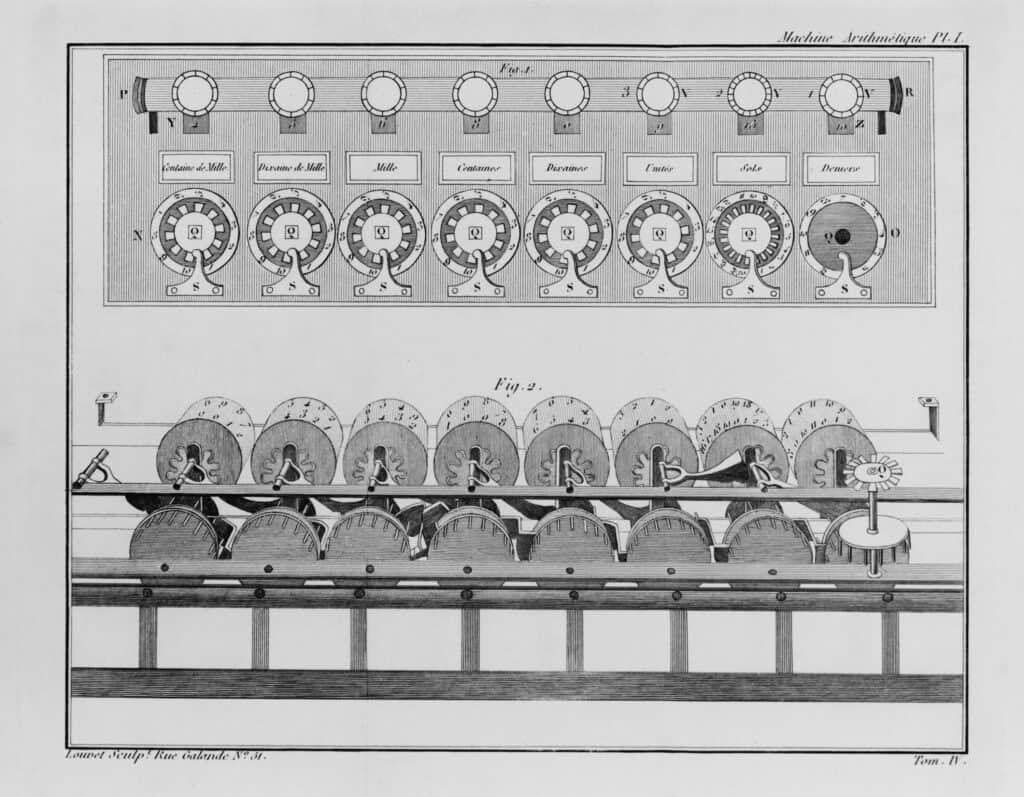
.
©Everett Collection/Shutterstock.com
Pascal’s Principle or Pascal’s Law
Pascal’s law came from his work with liquids, gases, and atmospheric pressure. It essentially states that a pressure change to a liquid in a closed container will be equally distributed to fluid in every part of the container. This helps to explain the interaction between gas and liquid as atmospheric pressure changes occur. It is also a principle that has been adhered to in many inventions today, such as the modern car engine.
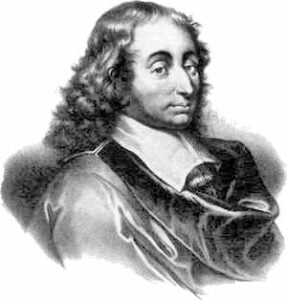
During Pascal’s Worldly Period, he focused on issues like math, geometry, and air pressure while also creating numerous inventions.
Pascal’s Wager
Pascal’s Wager is the religious theory developed by Pascal that helped to inform why he became a religious believer. It is an almost ruthlessly pragmatic way of looking at religion. It holds that humans should seek God and become religious believers because if God is real, the benefits of believing in God will be essentially infinite, as doing so can lead to eternal salvation. However, if God is not real, the “losses” of believing in God will be limited to some material losses. As such, there is more of an upside to this wager than a downside.
This Wager did not necessarily expound upon which “version” of God was the correct one, nor does it prove the existence of God — it simply notes that it is more worth it for someone to attempt to be religious and seek God than not worth it.
The theory was first expounded upon in Pensees, one of Pascal’s most famous literary and religious works.
Pascal’s Theorem
Pascal’s theory — also known as Pascal’s theorem — is one of Pascal’s most significant contributions to the field of geometry. The theory holds that, if six points are chosen on a conic (which is the curve you get at the intersection of a cone and a plane) and that those sections are joined by lines to form a hexagon then three of those lines will meet at three points on a straight line.
This idea was considered revolutionary in the 17th century and made a major impact on the study of geometry and spatial relations.
Triangles & Probability
Pascal’s worth as a mathematician was expanded upon again when he figured out ways to use the triangle to advance probability theory
Pascal developed Pascal’s Triangle, which is a series of integers placed in the form of triangles in which each successive row is developed by adding to integers next to it. It uses algebra, addition, subtraction, and more. This triangle would then be used to advance certain mathematical challenges, including probability.
Pascal worked with Pierre de Fermat to develop a theory of probability that helped determine “fairness” and how the winnings of a game of chance could be distributed in the event that the game was interrupted by outside sources. In this example, Pascal realized that he could use his triangle to determine the fairest way to distribute the prize money.
Roulette Wheel
Pascal is actually the inventor of the first roulette wheel. This started as part of Pascal’s efforts in 1655 to invent a perpetual motion machine. He was unsuccessful in doing so but instead did invent the roulette wheel. Eventually, Pascal’s Roulette wheel would have a zero added to it and make its way around the world, becoming a casino fixture.
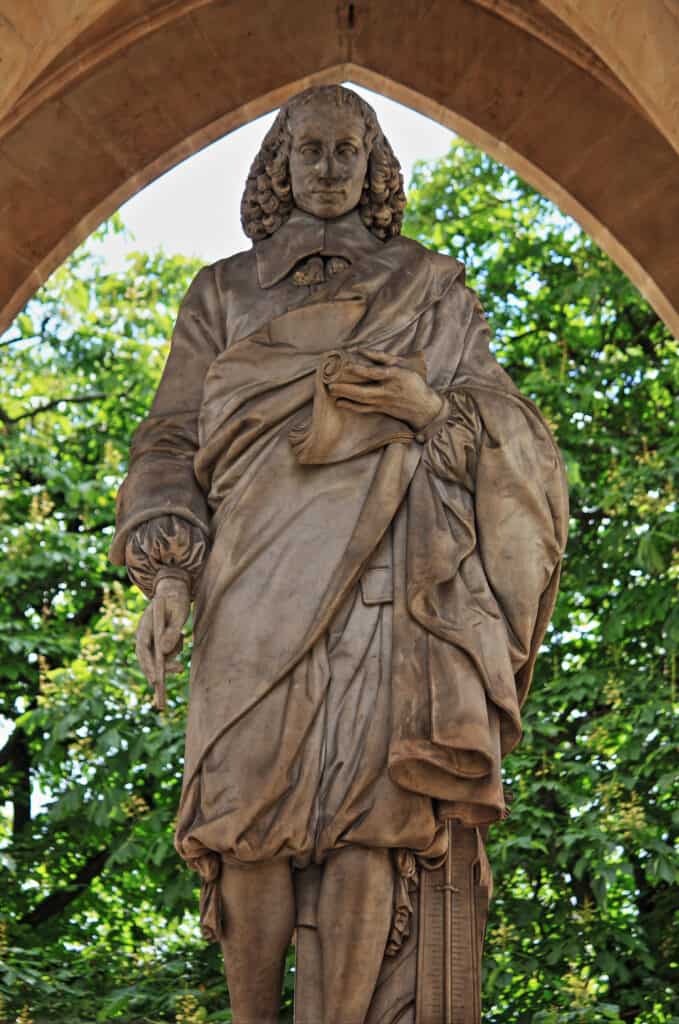
©Millionstock/Shutterstock.com
Blaise Pascal: Net Worth, Family Life, Death, and Tragedy
Net Worth
As finances were not as closely tracked during this time period as they are today, Pascal’s personal financial situation — including his specific net worth — is not widely known. However, Pascal never appeared to want for money or resources and was described as having access to luxuries of the time period. Furthermore, the stratification of 17th-century France made it clear that only individuals of means could prove to be intellectually successful and influential. This — combined with the high station of his father in French society — makes it clear that Pascal was a man of financial means.
Marriage & Children
Pascal never married and is not known to have fathered any children. His family life appeared largely centered around his father and sister, and aside from this, Pascal was not known to have any major family life.
Tragedy
Like many born in the 17th century, Pascal’s life was interwoven with tragedy and loss. His mother died when he was 3 years old.
Death
Pascal became extremely ill in 1662, even more so after the death of his sister. He was so sick in August of that year that he could not be moved to a hospital. He died on August 16, 1662. An autopsy revealed problems with his abdomen and brain, including a brain lesion. Contemporary speculation holds that Pascal likely died of either tuberculosis, stomach cancer, or both.
Blaise Pascal: Awards and Achievements
Pascal is not known to have won any awards during the time he was alive. However, his name lives on in many forms, including a university, countless awards, numerous pieces of literature, and multiple references in popular culture. Various theorems and works written by Pascal are still taught today.
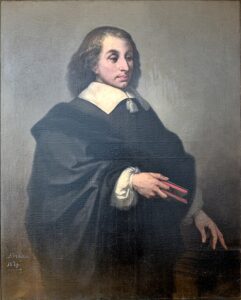
Pascal and his sister, Jacqueline, were both child prodigies, her in literature and him in mathematics.
Blaise Pascal: Published Works and Books
Pascal had many works published, all in his native French. They include:
Pensees
In Pensees, Pascal expounds upon his conversion and religious beliefs as a Christian. This book would serve as the foundation for Pascal’s Wager.
The Provincial Letters
In The Provincial Letters, Pascal defends the beliefs of Jansenists against attacks by Jesuits. The book is not a book, per se, but actually a series of letters written by Pascal. He wrote the letters under the name Louise de Montatle.
The Thoughts of Blaise Pascal
The Thoughts of Blaise Pascal is actually not a book — it is a series of writings written by Pascal and published after his death. It addresses a variety of topics, including religion, God, sin, and more. It was published in 1901.
Blaise Pascal: Quotes
- “All of men’s miseries derive from not being able to sit in a quiet room alone.”
- “The heart has its reasons of which reason knows nothing.”
- “Justice without force is powerless; force without justice is tyrannical.”
- “Men never do evil so completely and cheerfully as when they do it from religious conviction.”
The image featured at the top of this post is ©Public domain, via Wikimedia Commons – License / Original
